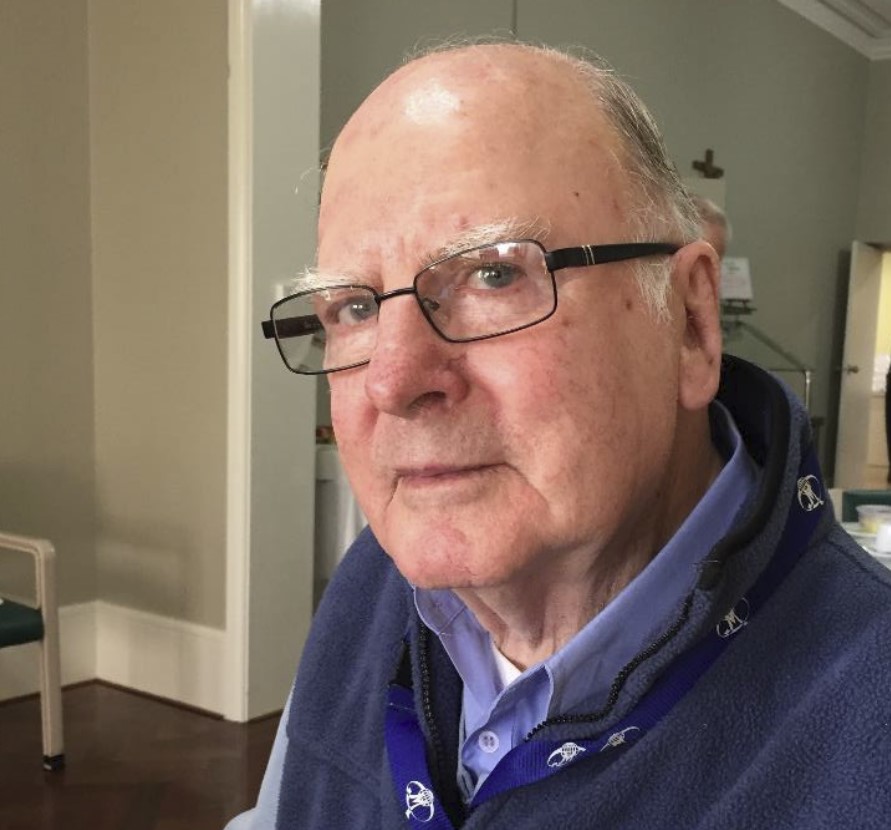
Bernard Murphy
Mark Denis Murphy was born 13 May 1931, the second of Mary (nee Bashall) and Denis Murphy’s six children. Peter, David and Denis predeceased Bernie; only Des (Terry) and Carmel remain.
The Murphy’s contact with the Brothers pre-dated their schooling at Eastwood, for they had an uncle who was a Marist Brother – Canice Murphy. In fact, three of the boys entered the Institute, but David left after some years and married. Mark was the first to head to the Mittagong Juniorate, at age 12, in January 1944. On the train from Central he met up with another aspiring Brother, John Rudolph Davidson (Tom More) and they developed a life-long friendship. He remained at Mittagong for seven and a half years and took first vows on 2 July 1951. He was one of the few Brothers of his era who had the opportunity for a scholasticate, even though only for one year. After he was appointment to Kogarah where he excelled as a Primary teacher: creative, kind, effective.
In fact Bernie had many ministries during the course of his life: Primary teacher, Principal, Community Leader, Novice Master, Formator, Accompanier, Farmhouse community member. However he had a single mission – to nurture, encourage and assist people be the best they could and to experience the presence and love of God. At a young age he discovered he loved people, humanity, and that he wanted to love them by serving them, and serving meant first affirming. He would look intently at you with his luminous blue eyes, deep into your spirit. He had a unique way of connecting with you as soon as he met you.
Despite his oft-used catch cry “the monks are skunks”, Bernie had a true love and affection for the Brothers, all of them, even those of us who could be a tad difficult or taciturn. As a Community Leader he took a personal interest in each one and came to know them individually. He had a unique way of confronting a person who needed to be challenged; but it was never done in anger or harsh judgment. He encouraged rather than alienated. It was common for him to greet a confrere with the words ‘jeez your wonderful!’ As a result, he was respected by each Brother and many sought his counsel in difficult personal times. Some would claim he was the most caring, and at the same time, most challenging Superior they ever had.
After the Novitiate I was appointed to Canberra where Bernie was the Leader. He was a blessing for a young Brother, and the Council must have known this because of the 21 Brothers in the Community, seven were aged under 30. If you were not at Morning Prayer he would come and knock on your door, not to reprimand, but because he knew “you really wanted to be there”. He had the difficult task of informing me that my sister had died unexpectedly; and he did so with deep empathy and compassion. Thereafter he kept in contact with my mother until she died in 2007. She and I both received the home-made notes for which he was famous; written in his beautiful script expressing admiration and support or offering a question for reflection or just making a comment. On the front was often a simple sketch or cartoon from his artistic fingers.
Bernie practiced the same blend of skills when he was Novice Master in the 1980s and when he was a member of the Community Pastoral Team (CPT) visiting communities and supporting Brothers in the 1990s. According to Graham Neist, Bernie delighted in being, what he called, a social interventionist which underpinned his style of accompaniment; he explained it as “I pinch, you squeal”. While it sounds aggressive, in reality it was just a technique to ensure people engaged and responded. It came in various guises, sometimes through the notes he wrote, at other times it was from the liberal comments he made throughout the day – “you’re going good”, “you’re doing a great job”.
Bernie was blessed with an outgoing, vivacious and fun-loving nature, but it was also a very fragile one, and at times it fractured. He was a man with a clown’s face – tear included. His deep empathy grew out of his own experience of emotional pain and suffering. He knew personally the depths of depression and the struggles of those with mental illness. This was his cross, the flip-side of his extraordinary humanity, sensitivity and faith. In later life he was particularly distressed by the sexual abuse that occurred at Canberra while he was there. He prided himself on his insight and intuition, but he never recognised what was happening; he connected well with people, but no-one ever confided in him. It took a long time for him to recover, and maybe he never did fully. To use Henri Nouwen’s image, he really was a ‘wounded healer’.
Beauty, poetry, classical music, the transcendental and divine were central to him. Prayer, scripture, reflection, silence – all were integral to his life. His close friends knew he was a mystic. It was as though he had a foot in both the eternal and the material worlds. He was the sort of mystic we need to see – the fun loving, playful, teasing mystic, full of compassion and pleasure, simply enjoying this life in God.
